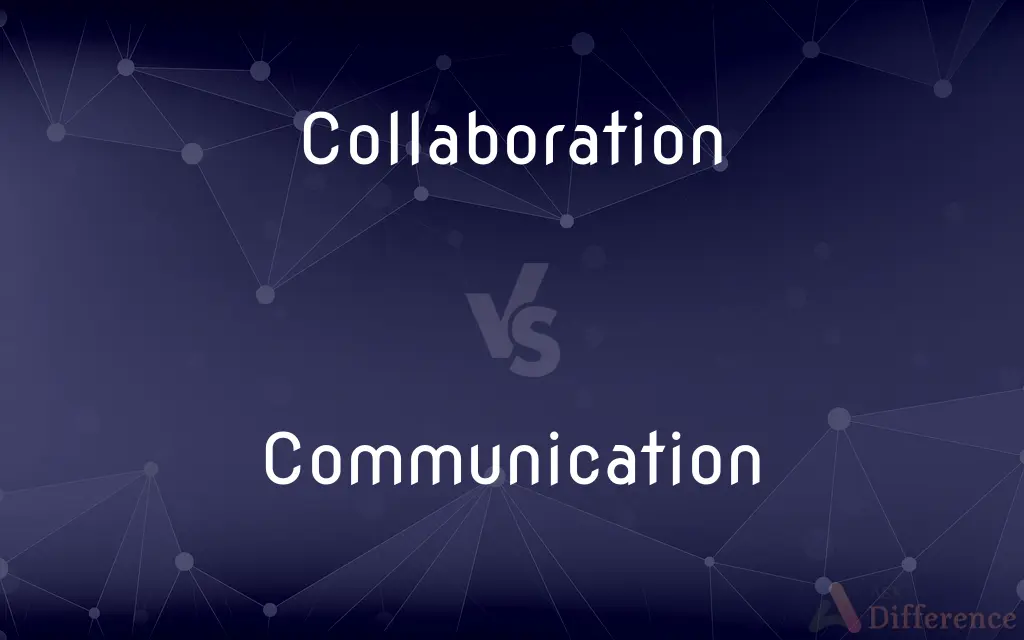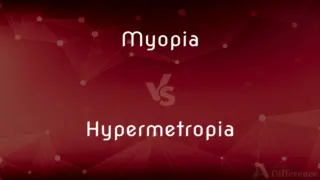Collaboration vs. Communication — What's the Difference?
By Fiza Rafique & Urooj Arif — Updated on April 7, 2024
Collaboration involves working together towards a common goal, emphasizing joint effort and contribution. Communication is the process of exchanging information, ideas, or feelings, serving as a foundation for effective collaboration.

Difference Between Collaboration and Communication
Table of Contents
ADVERTISEMENT
Key Differences
Collaboration is the act of two or more individuals or groups working together to achieve a shared objective. This process requires coordinating efforts, sharing resources, and sometimes compromising to ensure the success of the common goal. Communication, on the other hand, is the mechanism through which collaboration is facilitated. It involves the exchange of messages, ideas, or emotions between individuals or groups, using various mediums and channels. Effective communication is essential for successful collaboration, as it helps align goals, clarify tasks, and resolve conflicts.
Collaboration often involves a structured approach where roles and responsibilities are defined, ensuring that each participant contributes towards the common objective. It can take place in various settings, including workplaces, educational institutions, and community projects, and requires a level of mutual respect and understanding among participants. Communication, while a critical component of collaboration, extends beyond it. It encompasses not only the sharing of information relevant to a common project but also the everyday interactions that occur between people. Communication can take many forms, including verbal, non-verbal, written, and visual, and is not limited to collaborative efforts.
The effectiveness of collaboration is heavily dependent on the quality of communication within the group. Clear, open, and honest communication fosters trust and respect, which are vital for a collaborative environment. It ensures that everyone is on the same page and that any issues or misunderstandings are swiftly addressed. Conversely, communication can occur without the intent to collaborate. Individuals communicate for a variety of reasons, including to inform, persuade, entertain, or express emotions. While effective communication can lead to successful collaboration, not all communication necessarily leads to a collaborative effort.
Collaboration is a focused, collective action towards a shared goal, requiring structured coordination and joint effort, while communication is a broader concept that involves the exchange of information or ideas. Both are intertwined, with communication acting as the lifeblood of collaboration, enabling participants to share knowledge, negotiate roles, and work effectively towards their common objectives.
Comparison Chart
Definition
The act of working together with one or more people to achieve a common goal.
The exchange of information, ideas, or feelings between two or more parties.
ADVERTISEMENT
Key Components
Joint effort, shared objectives, mutual respect.
Message, medium, feedback, context.
Purpose
To achieve a specific outcome or goal through combined efforts.
To convey or exchange information and understand each other.
Required Skills
Teamwork, compromise, coordination.
Listening, articulating, non-verbal cues, clarity.
Outcomes
A product, solution, or achievement resulting from combined efforts.
Enhanced understanding, alignment, decision-making.
Compare with Definitions
Collaboration
Involves pooling knowledge, skills, and resources.
Their collaboration combined expertise from different fields.
Communication
A foundational skill for personal and professional success.
Her strong communication skills led to rapid career advancement.
Collaboration
Aims for a collective outcome that benefits all parties.
Their collaboration resulted in an innovative product that revolutionized the market.
Communication
The process of sharing or exchanging information, ideas, or feelings.
Clear communication was key to understanding the client's needs.
Collaboration
Often necessitates compromise to harmonize diverse viewpoints.
The team's collaboration thrived on open dialogue and compromise.
Communication
Can be verbal, non-verbal, written, or visual.
Their communication strategy included social media, emails, and face-to-face meetings.
Collaboration
The act of working jointly towards a shared goal.
Through collaboration, the team developed a new software solution.
Communication
Essential for resolving conflicts and building relationships.
Open communication helped resolve the misunderstanding quickly.
Collaboration
Requires coordination and a shared understanding.
Effective collaboration led to the project's success ahead of schedule.
Communication
Involves listening and feedback for effective exchange.
Active listening improved their communication and project outcomes.
Collaboration
Collaboration is the process of two or more people, entities or organizations working together to complete a task or achieve a goal. Collaboration is similar to cooperation.
Communication
Communication (from Latin communicare, meaning "to share"or "to be in relation with") is "an apparent answer to the painful divisions between self and other, private and public, and inner thought and outer word." As this definition indicates, communication is difficult to define in a consistent manner, because it is commonly used to refer to a wide range of different behaviors (broadly: "the transfer of information"), or to limit what can be included in the category of communication (for example, requiring a "conscious intent" to persuade). John Peters argues the difficulty of defining communication emerges from the fact that communication is both a universal phenomena (because everyone communicates), and a specific discipline of institutional academic study.One possible definition of communication is the act of developing meaning among entities or groups through the use of sufficiently mutually understood signs, symbols, and semiotic conventions.
Collaboration
The action of working with someone to produce something
He wrote a book in collaboration with his son
Communication
The act of communicating; transmission.
Collaboration
Traitorous cooperation with an enemy
He faces charges of collaboration
Communication
The exchange of thoughts, messages, or information, as by speech, signals, writing, or behavior.
Collaboration
To work together, especially in a joint intellectual effort.
Communication
Interpersonal rapport.
Collaboration
To cooperate treasonably, as with an enemy occupation force in one's country.
Communication
The art and technique of using words effectively to impart information or ideas.
Collaboration
(uncountable) The act of collaborating.
Collaboration can be a useful part of the creative process.
Communication
The field of study concerned with the transmission of information by various means, such as print or broadcasting.
Collaboration
(countable) A production or creation made by collaborating.
The husband-and-wife artists will release their new collaboration in June this year.
Communication
Any of various professions involved with the transmission of information, such as advertising, broadcasting, or journalism.
Collaboration
(uncountable) Treasonous cooperation.
He has been charged with collaboration.
Communication
Something communicated; a message.
Collaboration
The act of working together; united labor.
Communication
A system, such as mail, telephone, or television, for sending and receiving messages.
Collaboration
The act of willingly cooperating with an enemy, especially an enemy nation occupying one's own country.
Communication
A network of routes for sending messages and transporting troops and supplies.
Collaboration
Act of working jointly;
They worked either in collaboration or independently
Communication
Communications The technology employed in transmitting messages.
Collaboration
Act of cooperating traitorously with an enemy that is occupying your country
Communication
(Biology) The transfer of information from one molecule, cell, or organism to another, as by chemical or electrical signals or by behaviors.
Communication
An opening or connecting passage between two structures.
Communication
A joining or connecting of solid fibrous structures, such as tendons and nerves.
Communication
The act or fact of communicating anything; transmission.
Communication of smallpox
Communication of a secret
Communication
(uncountable) The concept or state of exchanging data or information between entities.
Some say that communication is a necessary prerequisite for sentience; others say that it is a result thereof.
The node had established communication with the network, but had as yet sent no data.
Communication
A message; the essential data transferred in an act of communication.
Surveillance was accomplished by means of intercepting the spies' communications.
Communication
The body of all data transferred to one or both parties during an act of communication.
The subpoena required that the company document their communication with the plaintiff.
Communication
An instance of information transfer; a conversation or discourse.
The professors' communications consisted of lively discussions via email.
Communication
A passageway or opening between two locations; connection.
A round archway at the far end of the hallway provided communication to the main chamber.
Communication
(anatomy) A connection between two tissues, organs, or cavities.
Communication
(obsolete) Association; company.
Communication
Participation in Holy Communion.
Communication
(rhetoric) A trope by which a speaker assumes that his hearer is a partner in his sentiments, and says "we" instead of "I" or "you".
Communication
The act or fact of communicating; as, communication of smallpox; communication of a secret.
Communication
Intercourse by words, letters, or messages; interchange of thoughts or opinions, by conference or other means; conference; correspondence.
Argument . . . and friendly communication.
Communication
Association; company.
Evil communications corrupt good manners.
Communication
Means of communicating; means of passing from place to place; a connecting passage; connection.
The Euxine Sea is conveniently situated for trade, by the communication it has both with Asia and Europe.
Communication
That which is communicated or imparted; intelligence; news; a verbal or written message.
Communication
Participation in the Lord's supper.
Communication
A trope, by which a speaker assumes that his hearer is a partner in his sentiments, and says we, instead of I or you.
Communication
The activity of communicating; the activity of conveying information;
They could not act without official communication from Moscow
Communication
Something that is communicated by or to or between people or groups
Communication
A connection allowing access between persons or places;
How many lines of communication can there be among four people?
A secret passageway provided communication between the two rooms
Common Curiosities
Can collaboration exist without communication?
Effective collaboration typically requires communication to align goals and coordinate efforts, making it difficult to collaborate successfully without communication.
Can communication occur without the intention to collaborate?
Yes, communication can happen for various purposes, such as sharing information or expressing feelings, without the aim to collaborate.
What is the difference between collaboration and communication?
Collaboration is the joint effort towards a common goal, while communication is the exchange of information necessary for collaboration and other interactions.
Why is communication important for collaboration?
Communication ensures that collaborators understand each other, align on objectives, and resolve conflicts, which are essential for the success of any collaborative effort.
How do cultural differences affect communication and collaboration?
Cultural differences can influence communication styles and expectations, requiring cultural sensitivity and adaptability for successful collaboration.
Can poor communication hinder collaboration?
Yes, poor communication can lead to misunderstandings, conflicts, and misaligned goals, which can significantly hinder collaborative efforts.
What are some key components of effective communication in collaboration?
Key components include clarity, active listening, timely feedback, and understanding non-verbal cues.
What role does non-verbal communication play in collaboration?
Non-verbal cues complement verbal communication, conveying emotions, reactions, and understanding, which are crucial for trust and rapport in collaboration.
How does technology impact collaboration and communication?
Technology facilitates both by providing tools and platforms for remote collaboration and diverse communication channels, overcoming geographical barriers.
Is collaboration always beneficial?
While collaboration can lead to enhanced outcomes, its success depends on effective communication, mutual respect, and the willingness to compromise.
Share Your Discovery

Previous Comparison
Myopia vs. Hypermetropia
Next Comparison
Badger vs. RaccoonAuthor Spotlight
Written by
Fiza RafiqueFiza Rafique is a skilled content writer at AskDifference.com, where she meticulously refines and enhances written pieces. Drawing from her vast editorial expertise, Fiza ensures clarity, accuracy, and precision in every article. Passionate about language, she continually seeks to elevate the quality of content for readers worldwide.
Co-written by
Urooj ArifUrooj is a skilled content writer at Ask Difference, known for her exceptional ability to simplify complex topics into engaging and informative content. With a passion for research and a flair for clear, concise writing, she consistently delivers articles that resonate with our diverse audience.














































